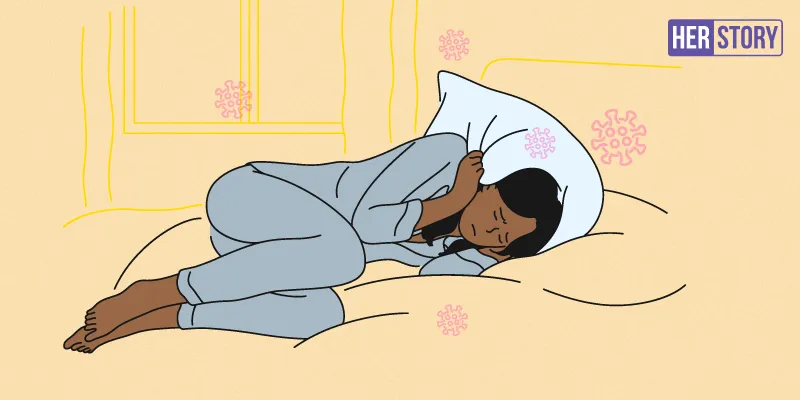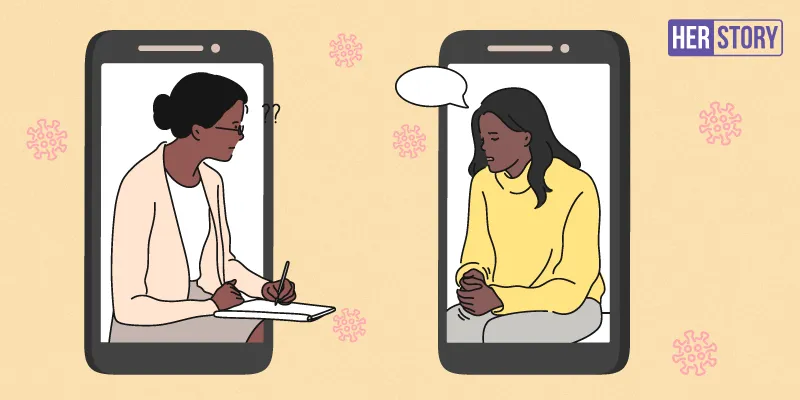Coping with loss, grief and anxiety, how the second wave of COVID-19 is affecting the mental health of women
The second wave of COVID-19 has been especially hard on the Indian population due to its high mortality rates and inadequacies in healthcare. HerStory takes a look at how the feelings of grief, loss and anxiety brought on by it has affected women’s mental health.
The COVID-19 pandemic continues to have far-reaching effects on the mental health of populations all over the world.
With a number of countries, especially India, reeling under a second wave, the increase in the number of fatalities, lack of adequate healthcare resources, and a feeling of helplessness have taken their toll on the mental health of both men and women.

A research study by CARE International revealed that while almost everyone experienced anxiety and emotional fatigue because of the pandemic, women suffered three times more when it came to mental health. The study showed that 27 percent of women reported anxiety, loss of appetite, sleeplessness, across the world as compared to 10 percent reported by men.
As the primary caregiver of a parent with Alzheimer’s, Ritika* has found the pandemic particularly hard. She had to quit work at an NGO, as managing caregiving, school-times for her children and office took its toll.
“I can say Zoom fatigue and caregiving caused the burnout. I’m also an introvert. So being in front of a camera caused intense exhaustion and stress. It has caused me to forget well-practised social skills, including making small talk, etc. Also, the overwhelming grief out there, with friends losing parents and loved ones, made me feel overcome with emotions all the time,” she says.
In fact, on the day we spoke, she was anxious about what was in store that evening during PM Modi’s address to the nation.
Anxiety seems to be a recurring problem faced by many, including a large number of women. According to Dr Milan Balakrishnan, a Mumbai-based psychiatrist and psychotherapist, “The second wave has impacted everyone and has increased the risk of anxiety and depressive disorders. Women are more prone to depressive disorders and many who were at a higher risk for anxiety disorders have developed full blown disorders,” she says.
“We are seeing more patients with panic disorders – palpitations, restlessness, difficulties in breathing and feelings of impending doom,” he adds.
He speaks of an instance where a 17-year-old was admitted in a Covid ward for long with breathlessness, cough, and restlessness. “She said she didn’t feel better and needed to stay. Only after multiple sessions of educating her that all these could be symptoms of anxiety disorder and not Covid alone, did she finally agree to go home.”
In April this year, Nisha*, a Gurugram-based sustainability solutions advocate lost her father to COVID-19, even as she and the rest of her family members tested positive for the virus. Battling anxiety for the past 10 years, her panic attacks have started again. “As I still comprehend the grief, being there for my mother and myself, waking up or at times sleeping after panic attacks, I also recognise how a major part of this would have been avoidable if the right physical and mental health resources were available during this time,” she says.
Nisha continues working for over 10 hours every day, “handling added and very scary responsibilities, trying to survive in a world that doesn’t make sense anymore”.
Anagha*, a 32-year-old independent journalist from Bengaluru has seen her panic attacks peaking during the pandemic. “In the midst of all these, my brother decided to climb Mount Kilimanjaro, and my thoughts were along the lines of, ‘what if this was the last time I ever speak to him, what if I never see him again’”, she says. She also experiences a strong sense of personal loss with every death she hears about, even if she does not know the person.
Sahana*, a 24-year-old journalist from Bengaluru, started becoming increasingly anxious minutes before her work began. “My heart rate would shoot up and I would snap at everyone. Working from home, and the increasing workload made me more numb. I no longer wanted to meet, text or talk to people,” she says.
Last year, Vinita*, experienced anxiety after being “locked down” when she went home for a wedding. She’d cry a lot in her room, and things at work weren’t going great either. In June 2020, she returned to Bengaluru and discovered that staying alone wasn’t the best idea either.
Things at work got worse and Vinita started questioning every decision, and would be sad for days on end. She started seeing a therapist, and maintained a journal, which helped a bit.
“Fast forward March 2021, before the second wave hit, my entire family got Covid. I couldn't fly home because I couldn't put myself and them at risk. Things at work got worse and eventually, I quit. But the thought of helplessness and being constantly gaslighted at work for a year chewed on everything I did. Now, I second-guess myself, question each decision I take at my new workplace, each decision I take at home, w.r.t my family, I cry randomly, I have very low confidence, I keep wondering what's the point of it all. I am aware but sad, thinking about self-harm, thinking about being a failure,” she says.
Grief during COVID-19

Puroitree Majumdar, a clinical psychologist with YourDost, an online counselling and emotional wellness services startup, lists the important challenges faced by women during the second wave. These include relationship/marital issues, low confidence/self-esteem and fall in work-life balance.
“What’s different about the second wave is that people are experiencing grief, loss of a loved one, increased anxiety levels in taking care of loved ones who have Covid, and at the same time balancing their work in the middle of all this,” she says.
Dr Milan says grief has come along with the guilt. He has seen severe reactions with patients having multiple fainting and crying spells.
“The deaths have been sudden, in isolation, and often the rest of the family has also been in isolation. There has been a struggle for resources – hospital beds, oxygen cylinders and medications. A strong element of guilt with fears of having infected the deceased adds to the burden of guilt,” he says.
Dr Milan believes grief is a slow process, and allowing people to grieve naturally is sometimes the best approach. Puroitree says there has been a rise in the number of grief counselling sessions on the platform. They have also organised a number of webinars and training sessions on how to deal with grief as well as how to support those who are grieving.
Seeking help

Dr Milan puts it very simply, “Nobody should hesitate to seek help. These disorders, if diagnosed early, have better outcomes. Treating them will help people deal with stress more effectively and will create long-term strategies to build resilience and growth.”
The women that HerStory spoke to have been open about seeking therapy during these tough times.
Ritika says, “I finally went back to my therapist last month. I also joined a dementia caregiver support group, which helps me understand my own experience of caregiving, the guilt, exhaustion and stress.”
Nisha has also been actively seeking therapy for the past few weeks.
“A few things that helped included a friend giving me time to respond at my own pace, a neighbour sending food regularly, a support group to just hear others who might be in the same boat, crying heavily, going off social media for some time (because obviously the world and news cycle we live with is not of help),” she says.
Anagha consults her therapist almost every week and is facing the situation with “me-time” and a lot of “self-care”. She makes it a conscious effort to dress up every day, shoot, edit and upload YouTube videos on things she loves.
While Sahana would speak to her therapist during the early days, she stopped doing it when she found it difficult to muster energy for the conversations.
She took a break from work and went back home.
“Staying with family worked wonders for my mental state. Even on bad days, I know there will be someone to fall back on. I made myself a schedule – not to miss F1, football and reading, additionally an hour without screen-time every day. This has really helped me.”
Coping without feeling overwhelmed
Puroitree believes that with a focus on enhancing happiness, there is a need for intervention on three levels.
Individual level (Self-Care) - Working women generally shy away from taking help or are worried that they might get judged. They believe that they must excel at multitasking with their work and household chores. If they are in need of household help, they must make it a point to ask for help from their spouses or other members of the family. Multitasking brings in a lot of unwanted stress and can get overwhelming. During these times, it is critical that they must make it a point to take care of themselves physically and mentally.
Recharging - Take out at least half an hour to one hour a day to recharge and renew your energy. Take up some form of exercise (yoga, meditation, aerobics, Zumba, or some hobby that you like to do).
Making to-do lists - Categorise each activity you have on your plate based on commonality or arrange them in a hierarchy based on importance and urgency. Allocate time properly and act on completing each activity as planned. Reward yourself after achieving things as planned.
Delegating - Delegate when you are unable to perform due to high workload or lack of skills. Identify the right person to delegate to, communicate and define the task clearly, have regular follow-ups to know the progress and micromanage. Appreciate and acknowledge.
Establishing boundaries with co-workers - Limit work only to work hours. In case of extra work - allot time for it and stick to it strictly. Take your day-offs and use them effectively to spend time with your family or with yourself and rejuvenate.
Communicating - Discuss everyday tasks that your partner might be able to help you with. Listen to others’ points of view and respect the differences of opinion. In case of serious or extreme issues, couple counseling can help.
Community level (Peer-Support)
Companies must make it mandatory for their respective communities - managers, employees, staff, everyone to undergo increased awareness and dialogue on women-specific Issues.
Organisational level (Culture)
Whether it be companies, NGOs, institutions, or at the governmental level, we need to make sure that women's mental health is the agenda at the leadership level. We need to consciously create female role models at the workplace.
Apart from these, she advises all women to fit some “me-time” into their routine every day, be kind to themselves, and bring in a sense of mindfulness and gratitude.
(*All names changed on request)
Edited by Anju Narayanan







